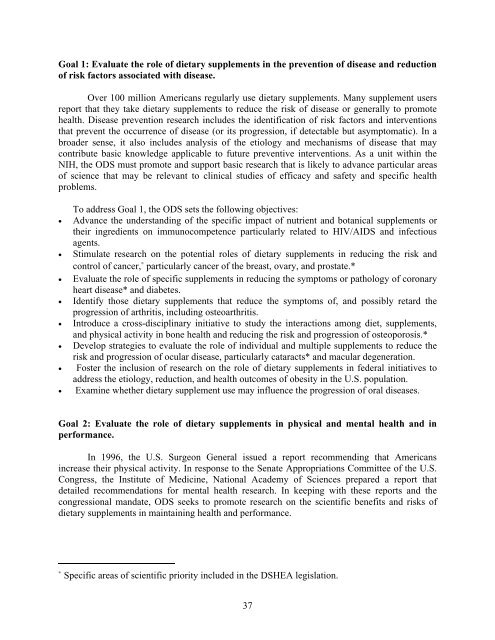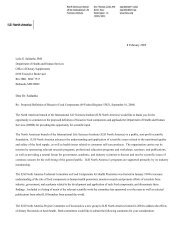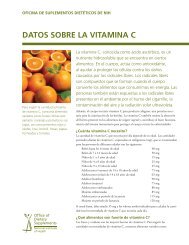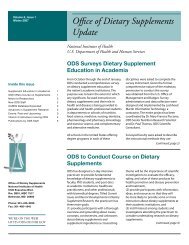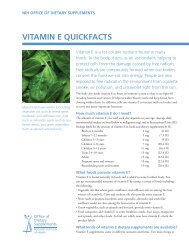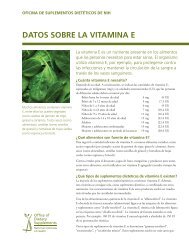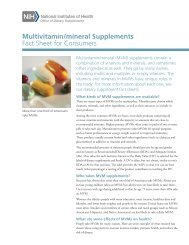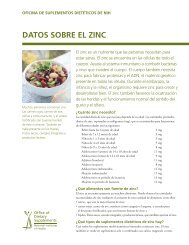status report - Office of Dietary Supplements - National Institutes of ...
status report - Office of Dietary Supplements - National Institutes of ...
status report - Office of Dietary Supplements - National Institutes of ...
Create successful ePaper yourself
Turn your PDF publications into a flip-book with our unique Google optimized e-Paper software.
Goal 1: Evaluate the role <strong>of</strong> dietary supplements in the prevention <strong>of</strong> disease and reduction<br />
<strong>of</strong> risk factors associated with disease.<br />
Over 100 million Americans regularly use dietary supplements. Many supplement users<br />
<strong>report</strong> that they take dietary supplements to reduce the risk <strong>of</strong> disease or generally to promote<br />
health. Disease prevention research includes the identification <strong>of</strong> risk factors and interventions<br />
that prevent the occurrence <strong>of</strong> disease (or its progression, if detectable but asymptomatic). In a<br />
broader sense, it also includes analysis <strong>of</strong> the etiology and mechanisms <strong>of</strong> disease that may<br />
contribute basic knowledge applicable to future preventive interventions. As a unit within the<br />
NIH, the ODS must promote and support basic research that is likely to advance particular areas<br />
<strong>of</strong> science that may be relevant to clinical studies <strong>of</strong> efficacy and safety and specific health<br />
problems.<br />
To address Goal 1, the ODS sets the following objectives:<br />
• Advance the understanding <strong>of</strong> the specific impact <strong>of</strong> nutrient and botanical supplements or<br />
their ingredients on immunocompetence particularly related to HIV/AIDS and infectious<br />
agents.<br />
• Stimulate research on the potential roles <strong>of</strong> dietary supplements in reducing the risk and<br />
control <strong>of</strong> cancer, ∗ particularly cancer <strong>of</strong> the breast, ovary, and prostate.*<br />
• Evaluate the role <strong>of</strong> specific supplements in reducing the symptoms or pathology <strong>of</strong> coronary<br />
heart disease* and diabetes.<br />
• Identify those dietary supplements that reduce the symptoms <strong>of</strong>, and possibly retard the<br />
progression <strong>of</strong> arthritis, including osteoarthritis.<br />
• Introduce a cross-disciplinary initiative to study the interactions among diet, supplements,<br />
and physical activity in bone health and reducing the risk and progression <strong>of</strong> osteoporosis.*<br />
• Develop strategies to evaluate the role <strong>of</strong> individual and multiple supplements to reduce the<br />
risk and progression <strong>of</strong> ocular disease, particularly cataracts* and macular degeneration.<br />
• Foster the inclusion <strong>of</strong> research on the role <strong>of</strong> dietary supplements in federal initiatives to<br />
address the etiology, reduction, and health outcomes <strong>of</strong> obesity in the U.S. population.<br />
• Examine whether dietary supplement use may influence the progression <strong>of</strong> oral diseases.<br />
Goal 2: Evaluate the role <strong>of</strong> dietary supplements in physical and mental health and in<br />
performance.<br />
In 1996, the U.S. Surgeon General issued a <strong>report</strong> recommending that Americans<br />
increase their physical activity. In response to the Senate Appropriations Committee <strong>of</strong> the U.S.<br />
Congress, the Institute <strong>of</strong> Medicine, <strong>National</strong> Academy <strong>of</strong> Sciences prepared a <strong>report</strong> that<br />
detailed recommendations for mental health research. In keeping with these <strong>report</strong>s and the<br />
congressional mandate, ODS seeks to promote research on the scientific benefits and risks <strong>of</strong><br />
dietary supplements in maintaining health and performance.<br />
∗ Specific areas <strong>of</strong> scientific priority included in the DSHEA legislation.<br />
37


